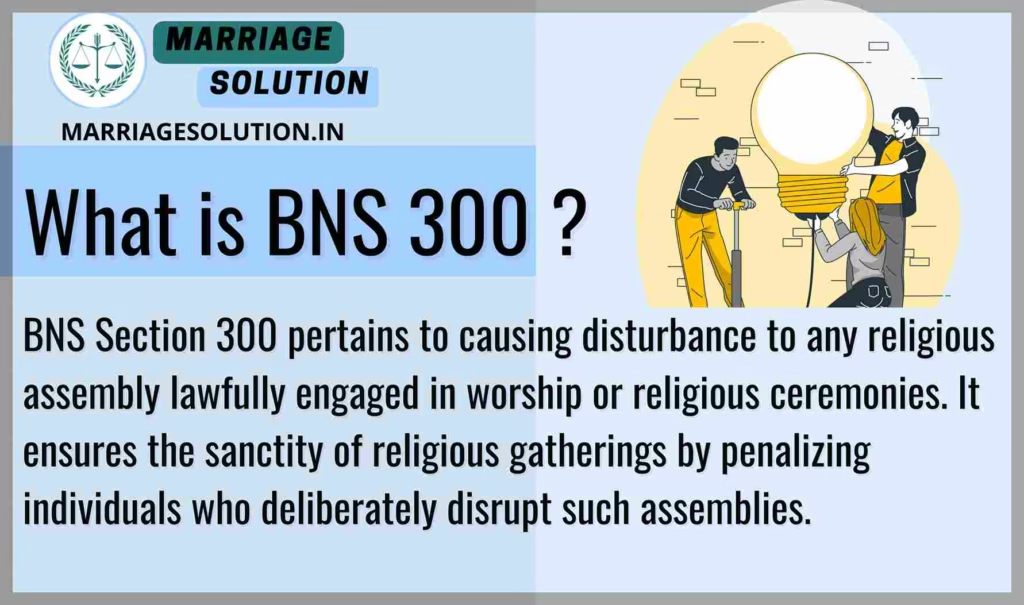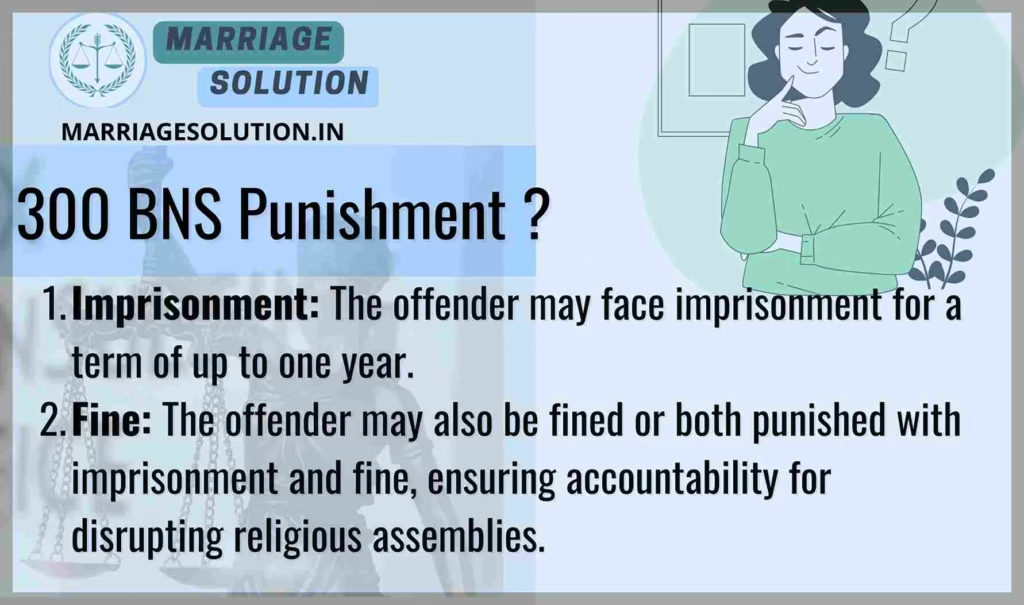Introduction of 300 BNS
300 BNS safeguards the sanctity of religious gatherings by penalizing anyone who deliberately causes disturbance during lawful worship or ceremonies. It emphasizes the importance of preserving peace and harmony in a diverse society where multiple faiths coexist. By replacing IPC Section 296, this provision ensures that religious assemblies are conducted without interference, reinforcing the constitutional right to freedom of religion.
The Bharatiya Nyaya Sanhita (BNS) Section 300 replaces the old Indian Penal Code (IPC) Section 296.
What is BNS Section 300 ?
BNS Section 300 pertains to causing disturbance to any religious assembly lawfully engaged in worship or religious ceremonies. It ensures the sanctity of religious gatherings by penalizing individuals who deliberately disrupt such assemblies.

Under Section 300 of the bns act 2023
“Whoever voluntarily causes disturbance to any assembly lawfully engaged in religious worship or religious ceremonies shall be punished with imprisonment up to one year, or with fine, or with both.”
1. Meaning of Section 300
- This section punishes voluntary disturbance of assemblies engaged in lawful religious worship or ceremonies.
- “Disturbance” means any intentional act that interrupts, distracts, or disrupts such gatherings.
- Only deliberate acts are punishable — accidental disruptions are excluded.
- The purpose is to protect the sanctity of religious gatherings and ensure freedom of worship.
2. Who is Covered?
This section applies to:
- Individuals – Any person who creates noise, chaos, or other disturbance during worship.
- Groups – Those who intentionally disrupt religious ceremonies or events.
- Organizers of Disruptions – People who plan protests or disturbances during religious functions.
- Anyone causing interruption – Whether inside or near the place of assembly, if their act disturbs proceedings.
3. Nature of the Offense
- Cognizable → Police can register a case and act without prior approval from a magistrate.
- Bailable → The accused can get bail as a matter of right.
- Non-Compoundable → Cannot be privately settled; trial is mandatory.
- Triable by → Any Magistrate.
4. Examples of BNS Section 300
- Example 1 – Loud Disruption
During a temple prayer, someone intentionally plays loud music outside to disturb worshippers → Punishable under Section 300. - Example 2 – Public Chaos
At a church service, an individual shouts slogans to interrupt prayers → Covered under Section 300. - Example 3 – Interruption at Ceremony
During a lawful religious procession, a person throws objects to create chaos → Liable under Section 300.
5. Punishment under BNS Section 300
- Imprisonment → Up to 1 year.
- Fine → Monetary penalty may be imposed.
- Both → Court may award both imprisonment and fine, depending on severity.
6. Importance of BNS Section 300
- Protects the right to religious freedom.
- Ensures peaceful and respectful worship.
- Prevents communal tension caused by intentional disruptions.
- Reinforces the principle of mutual respect in a diverse society.
Section 300 BNS Overview
BNS Section 300 addresses the act of causing disturbance to religious assemblies lawfully engaged in worship or ceremonies. It aims to preserve the sanctity of such gatherings and penalizes those who disrupt them. Below are the detailed explanations of the key points.
10 Key Points of BNS Section 300
1. Protection of Religious Assemblies
This section safeguards the peace and sanctity of religious gatherings. Religious assemblies include groups of individuals lawfully gathered for worship or ceremonies. Such protection ensures that individuals can practice their faith without fear of interference, which is a cornerstone of mutual respect in a diverse society. Disturbances disrupt not only the assembly but also the fundamental right to religious freedom guaranteed by the Constitution.
2. Definition of “Disturbance”
Disturbance refers to any intentional act that interrupts or disrupts a religious gathering. This could include loud noises, physical actions, or other behaviors that hinder the peaceful proceedings of worship or ceremonies. The term “voluntarily” in the law highlights that the disruption must be intentional to qualify as an offense under this section.
3. Scope of Applicability
BNS Section 300 applies to all religions and ensures equal protection for all lawful religious assemblies. It encompasses diverse faiths, rituals, and practices, promoting harmony in a multicultural society. By including all lawful gatherings, it upholds the principle of secularism and respects every individual’s right to religious expression.
4. Punishment for Disturbance
The punishment for violating this section can include imprisonment for up to one year, a fine, or both. The severity of the punishment depends on the degree of the disruption caused. This ensures that the consequences are proportionate to the act, serving as both a deterrent and a corrective measure for offenders.
5. Cognizable Offense
Being a cognizable offense, the police have the authority to register a case and investigate without prior approval from a magistrate. This allows law enforcement to take immediate action to prevent or address disturbances, ensuring timely protection of religious assemblies.
6. Bailable Nature of the Offense
The offense is bailable, meaning the accused can secure bail to avoid detention during the trial. This provision strikes a balance between ensuring accountability and upholding the rights of the accused. Bail is generally granted unless there is a risk of repeated offenses or other legal concerns.
7. Non-compoundable Offense
As a non-compoundable offense, cases under this section cannot be settled privately between the accused and the affected parties. This ensures that justice is served in the public interest, reinforcing the importance of protecting religious gatherings without compromise.
8. Role of Intent in the Offense
Intent is a critical factor in determining culpability under this section. The act of disturbance must be voluntary and deliberate. For instance, accidental noise or disruption without malicious intent does not fall under this law, highlighting its focus on preventing intentional harm.
9. Social and Cultural Impact
By penalizing disturbances to religious assemblies, this law fosters mutual respect and social harmony. It recognizes the importance of religious gatherings in cultural and spiritual life, emphasizing their value in maintaining a peaceful society. Disruptions can lead to conflicts and divisions, which this law aims to prevent.
10. Judicial Oversight and Fair Trial
Since the offense is triable by any magistrate, it ensures accessible and fair judicial proceedings. The magistrate evaluates evidence, intent, and circumstances before delivering a verdict. This process ensures justice is delivered while protecting the rights of both the accused and the victims
Two Examples of BNS Section 300
- Example 1:
During a lawful prayer session at a temple, an individual plays loud music near the venue with the intent to disrupt the worshippers. This act intentionally disturbs the assembly and violates BNS Section 300, making the individual liable for punishment. - Example 2:
At a lawful religious ceremony in a community hall, someone enters the space and starts shouting slogans to create chaos, interrupting the proceedings. This deliberate action to disturb the assembly falls under BNS Section 300.
BNS 300 Punishment
- Imprisonment: The offender may face imprisonment for a term of up to one year.
- Fine: The offender may also be fined or both punished with imprisonment and fine, ensuring accountability for disrupting religious assemblies.

BNS 300 bailable or not ?
Yes, the offense under BNS Section 300 is bailable. The accused can apply for bail and avoid prolonged detention before the trial begins. This ensures that the accused’s rights are preserved while allowing the judicial process to continue.
Comparison: BNS Section 300 vs IPC Section 296
| Section | Offense | Punishment | Bailable / Non-Bailable | Cognizable / Non-Cognizable | Trial By |
|---|---|---|---|---|---|
| BNS Section 300 | Disturbing any assembly lawfully engaged in religious worship or religious ceremonies (voluntary acts that interrupt or disrupt proceedings). | Imprisonment up to 1 year, or fine, or both. | Bailable | Cognizable | Any Magistrate |
| IPC Section 296 (Old) | Voluntarily disturbing any assembly lawfully engaged in religious worship or ceremonies (older statutory language; same subject-matter). | Imprisonment up to 1 year, or fine, or both. | Bailable | Cognizable | Any Magistrate |
BNS Section 300 FAQs
1. What does BNS Section 300 cover?
BNS Section 300 addresses voluntary disturbance of assemblies lawfully engaged in religious worship or ceremonies. It ensures the sanctity of such gatherings by penalizing disruptions.
2. What is the punishment for disturbing a religious assembly?
The punishment is up to 1 year imprisonment, a fine, or both. The exact penalty depends on the severity of the disturbance.
3. BNS 300 Is this offense bailable?
Yes, the offense is bailable, allowing the accused to secure bail and avoid detention during the judicial process.
4. Who tries cases under BNS Section 300?
Cases are triable by any Magistrate, ensuring swift and accessible justice for the affected parties.
Conclusion
BNS Section 300 reflects India’s commitment to protecting religious freedom and maintaining communal harmony. By penalizing deliberate disruptions of lawful religious assemblies, it ensures that citizens can practice their faith peacefully without fear of interference. The provision also discourages actions that may incite tension or disrespect diverse traditions. In a multicultural nation like India, such laws serve as a vital safeguard for unity, respect, and mutual tolerance.
Need Legal Support?
If you are dealing with court cases, marriage problems, or any other legal issue, our team at Marriage Solution – Lawyer Help is here for you. Simply fill out our quick online enquiry form, and we’ll connect you with the right legal expert to support your needs.
Finished with BNS 300 ? Continue exploring the next provisions of the Bharatiya Nyaya Sanhita (BNS), 2023. Each section includes explanations, examples, and plain-language breakdowns for easy understanding.
- 301 BNS :Trespassing on burial places, etc.
- https://marriagesolution.in/bns_section/301-bns/
- 302 BNS :Uttering words, etc., with deliberate intent to wound religious feelings of any person.
- https://marriagesolution.in/bns_section/302-bns/
CHAPTER XVII OF OFFENCES AGAINST PROPERTY.
- 303 BNS : Theft.
- https://marriagesolution.in/bns_section/303-bns/
- 304 BNS : Snatching.
- https://marriagesolution.in/bns_section/304-bns/
- 305 BNS : Theft in a dwelling house, or means of transportation or place of worship etc .
- https://marriagesolution.in/bns_section/305-bns/
Full IPC Section List: https://marriagesolution.in/ipc-section-list
All Indian Law & Blogs: https://marriagesolution.in/indian-law/
Full BNSS Section List: https://marriagesolution.in/bnss_section-list
